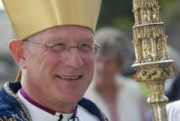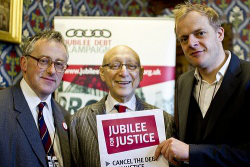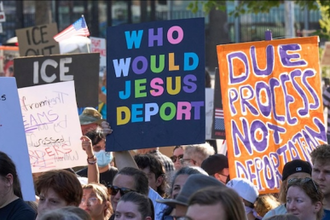Text: Bishop Peter Price at Oscar Romero Commemoration Service

Bishop Peter Price
Bishop Peter Price, Anglican Bishop of Bath and Wells, gave the following homily at a Commemoration Service for Archbishop Oscar Romero on Saturday at St Martin in the Fields, Trafalgar Square.
‘If they arrest me again, they will take my life.’ With these words Lutheran Bishop Medardo Gomez addressed me in El Salvador during a visit I made in 1988. A few months later he was arrested. An appeal from his supporters reached me and many others pleading for help. My contribution was a letter to the Independent calling for his release and to protest at the violence being metered out by the then authorities towards the church.
At midnight on the Saturday of that week I received news of Gomez’s release. Executioners on their way to his cell were told ‘Do not touch this man. He has too many friends in the international community for him to be killed.’ Needless to say there was great joy over his release.
I was not to see Gomez again until last September when I returned to El Salvador. One evening we dined in the kingdom of God with men and women who had suffered persecution during those terrible years of civil war. Among those present was Bishop Gomez. You may imagine something of the emotion that surrounded our re-union – embraces, tears – and yes, laughter. During the meal Gomez spoke of his release comparing it to the story in Acts where the church prayed for the release of St. Peter from prison. He concluded his remarks by saying: ‘St. Peter was released by an angel. I too was released by angels – but they were human.’
I begin with this story on the occasion of the commemoration of the martyrdom of Oscar Romero to remind us, if we need to be reminded, that the dark years of the civil war in El Salvador made many martyrs in the churches, known and unknown. No one can visit the memorial to the Jesuits without being moved by the artefacts in the Museum, clothes, body fragments containing precious DNA preserved as saints of old in glass ossuaries.
For me, however, the most evocative item was copy of Jurgen Moltmann’s The Crucified God, stained with the blood of Juan Ramon Moreno. Perhaps its significance was heightened because we had been accompanied on our visit by Jon Sobrino whose life had been spared because he had been out of the country. Moreno’s body had been left as warning in Sobrino’s room: the copy of Crucified God was his.
Our gospel today asks a question: ‘Who do people say that I am?’ Jesus enquires of his disciples. ‘And they told him’ – but ‘Who do you say that I am?’ Peter answered, ‘You are the Christ’ – and Jesus answered ‘I am the Crucified God ‘ – and later in the passage it is recorded that ‘Peter rebuked him’ – it was too much to take.
Is it too much for us to take? What does it mean to speak of being disciples of the Crucified God today? In our meeting last September with Jon Sobrino he began with these words: ‘We need help. No one has solved the problem of the poor.’ whilst speaking particularly of his own environment, he was making a universal statement.
In today’s El Salvador much is perceived as having improved. The war is over. Yet a third of the population is emigrating. The drug trade makes many victims. Young people are inveigled into gangs; women who experience violence and violation are forced to become drug mules as well as currency in the sex trade.
A report in the New York Times last week (13.03.2012) spoke of the conditions in a woman’s prison in San Salvador ironically called ‘Hope’. ‘Inmates at La Esperanza penitentiary here cram into “the caves” their name for the suffocating spaces beneath bunk beds, desperate for a place to sleep. Others sprawl out on every inch of floor under a thicket of exposed electrical wires in sweltering dirty cells, until they can come up with the $35 they will need to buy space on a bunk from fellow prisoners.’ Is it any wonder that prisoners such as these reflect: ‘I’d rather be dead than here.’
In a response the director of prisons in El Salvador speaking of a lack of resources for prisons said, ‘If the choice is to build a children’s hospital or a prison, which do you think is going to get done?’
‘God is against a world that gives death to others,’ reflected Sobrino. ‘Jesus of Nazareth was really touched by human beings. God defends and loves the poor. Who do we defend?’ The Crucified God identifies with those whom martyr Ignacio Ellacuria defined as ‘the Crucified People’.
To be a disciple of the Crucified God is to identify with the Crucified People. One of the biggest challenges that faces the church in the third millennium is how we find ways of inculturating the gospel. Jack Mahoney SJ, in his recent book Christianity in Evolution has argued that, ‘We can best do so by identifying the human needs and resources of this new global culture and by presenting the truths of the gospel in the way most suited to responding and meeting those needs and resources.’
Sharpening the focus of the gospel in such a way, invites us to re-imagine God’s salvation as being not so much from sin, as from death and mortality. Such an understanding – that Jesus is saving humanity from death, and all that destroys human-ness ‘might,’ argues Mahoney, ‘give a new relevance and vitality to preaching the gospel today.’
In his homily of 24th July 1977, Romero understood this: ‘The Church cannot remain silent when it sees these injustices of an economic nature, of a political nature, of a social nature. If it remains silent, the Church is complicit with those who marginalise themselves and are asleep in a conformity that is sickly and sinful, or with those who take advantage of this unawareness of the people to abuse them and corner the market politically and economically, marginalising the immense majority of the people.’
The church in the west is by and large silent. Self obsessed and conservative it has committed itself to a pursuit of narrow moral rightness, while the rest of the world goes to hell in a hand cart. Romero too is being marginalised and sanctified. In 1988 Romero’s remains had pride of place in the incomplete cathedral of San Salvador. Romero had declared the cathedral should not be completed while the people suffered.
Today the cathedral is complete. Romero’s remains lie in a specially prepared but unsigned undercroft. No more the crowds of poor seeking solace and inspiration. He is left for occasional curious tourists, seekers after memory, to find. Among politicians Romero has become the new icon; institutes, programmes, scholarships and much else beside, seek to elevate his memory and example.
Not too be scoffed at, I agree, but would Romero not find himself in agreement with Dorothy Day the Founder of the Catholic Worker who was once described as a saint and replied: ‘I wouldn’t want to be dismissed so easily?’
The true saints are of course those whom St. Luke calls ‘the little ones’ – those nameless ones hiding away in the barrios and villages, carrying the memory of others like them buried in the charnel houses of the civil war. Back in 1988, the church in El Salvador was warmed in its heart by the vision of the 1979 Conference at Puebla, where the ‘Option for the Poor’ was affirmed.
Lay workers, catechists, priests and people found inspiration and resource in three things: Jesus of Nazareth, a popular reading of the Bible, and the solidarity of helping each other through the base communities. Today the church is half the size it was in 1979. The energy of liberation theology is for too many a distant voice and experience, the base communities replaced by a re-assertion of hierarchy and repressive orthodoxy.
One night during our 2012 visit two catechists Eva and Armando risked the dangers of travel to the city to come and tell us their story. Schooled in the communities of the 80’s and 90’s, they continued to have hope in what they called ‘The tiny plant of the gospel that exists to bring the possibility of a new future.’ Despite hostility from the church hierarchy, and exile from formal church life, they pursued popular biblical reflection in the slums and poor villages.
Eva spoke of organising a Bible workshop with the Mexican woman theologian Regina Silvio on – The Ethics of the Kingdom in the Gospel of Mark. Armando said, ‘The Spirit of Jesus said after we had been thrown out of one church, come back to work with your people, because good news to the first disciples, as it is for us, begins with talking about what saves us.’
Following our conversation I invited them to stay for dinner. Whilst at the table waiting for the menu I decided to offer the assembled group a simple eucharist. I asked for bread and wine. When the bread came – it was garlic bread. Smiling to myself, I wondered ‘Does it work with garlic bread?’
I pronounced Jesus’ words, ‘This is my body – crucified – broken’ – ‘This is my blood – staining people, lives, books – broken, shed – for you.’ We passed the elements and shared the peace: tears flowed – the excluded had been included: bread for the journey; the tiny plant of the gospel offering a theology of hope – the dead had been raised to life.
Here were sacraments not telling the world what it should be, and how it should be different. Here were sacraments revealing the world as it truly is; what our lives as human beings are, and how we therefore can and should act.
If God is against a world that gives death to others, and Jesus of Nazareth was really touched by human beings: then how can those who serve God act differently? ‘No one has solved the problem of the poor’ observed Sobrino. Yet when the poor re-discovered Jesus of Nazareth; a popular reading of the scripture, and hierarchy came down from on high and made an option for the poor – all were engaged in the task of solving the problem.
We can commemorate and even sanctify, Romero, Gomez and many other named and nameless martyrs, but they would remind us that, in the words of Romero: ‘This is a question of life or death for the reign of God on this earth.’ So may we find the grace and courage to follow the Crucified – yet risen, ascended One – witness to radical compassion - and not rebuke him because His Way is too hard.
+Peter B Price
Bishop of Bath and Wells
















